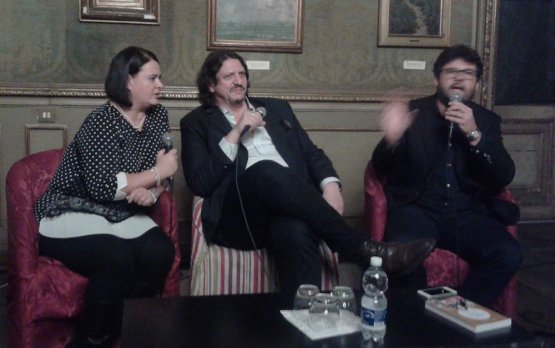«For my sister Amanda, who had to budge up at the table when I arrived». This is the dedication opening Jay Rayner’s “The Ten (Food) Commandments”. The author, 50-year old Londoner of Jewish ancestry, is a journalist and restaurant critic (for The Observer), radio and television presenter (BBC) and musician (he’s the pianist in the Jay Rayner Jazz Quartet). In this eclecticism there’s a constant element: wit – sometimes British, sometimes more improper -, a characteristic that makes Rayner one of the most appreciated food authors in the recent past.
The target of the latest pamphlet is food-obsessed contemporaneity. The idea is not new. Yet the point of view is innovative: «If he [God] was genuinely perfect», the author warns in the preface, «he would also have to have been the perfect dinner guest», capable of saying: «‘No crab for me please’ and ‘You know full well I don’t do cheese burgers’ […]». Which means «we need our very own culinary Moses; someone with the scholarship, dignity, insight and teeth to stand in judgement on everyone else». Who can hand us, miserable people, “The dining tablets” [Le leggi della tavola is the subtitle given by Luca Iaccarino curator of the “Allacarta XL” series to the Italian edition].

Jay Rainer with the Italian interpreter Daniela Mondino and Luca Iaccarino, the curator of the Edt Italian edition
Reading the first commandment –
Thou shalt always eat with thy hands – we immediately understand that while the author uses a witty style («British prime minister
David Cameron ate a hot dog with fork and knife and that’s a problem», or «I hope that people let their guard down and throw out some of the rules we have regarding etiquette and connect like animals.»), but he’s often serious too. For instance when he speaks of the finger/cutlery dialectic, according to which «The fork did not arrive in Europe until the 1630s, and did not become broadly popular until the 19th Century», a thought that leads the reader to think about how our eating is accidental. But then, did you appreciate food more before of after prongs became widespread? The author has no doubt: «there is nothing more satisfying than shoving the metal work to one side». Hard times, and not just for tablecloths.
The second commandment,
Thou shalt always honour leftovers, is coherent with the post-Expo theme: «start thinking like this, and the food you put on the table for lunch or dinner is not the end of the process. It’s just the beginning». Third,
Though shalt covet thy neighbour’s oxen, is another mantra of our times, imposing that we make discoveries made by others, our own: «Recipes must belong to all». Fourth,
Thou shalt cook (sometimes) because you need to know «The impact of boiling water on meat and vegetables». Fifth,
Thou shalt not cut out the fat, for instance the one from wagyu beef, « a rich but gentle lubrication, a pleasing slipperiness full of deeper, life affirming tones. It’s the fat. God, but I love fat.».

Rayner plays also as a jazz musician (photo by Shawn Pearce)
Sixth,
Thou shalt choose thy dining companions carefully, is one of the funniest: « I need people to come out to eat with me. But it’s also a nightmare, as drawn in a collaboration between
Munch and
Brueghel, with extra pitchforks, angst and leaping flames». Seventh,
Thou shalt not sneer at meat-free cookery, even though « The future of non-meat cookery is not in the hands of those who have sworn off eating animals altogether. It’s in the hands of those of us who are cutting down,
reductarians»). Eighth,
Thou shalt celebrate the stinky, ingesting «these ingredients that carry with them that faint whiff of death. Like jumping into an ice-cold river, the experience is utterly invigorating».
Ninth:
Thou shalt not mistake food for pharmaceuticals («There is not one food that will sort you out cancer-wise», he advised in the preface). Tenth,
Honour thy pig which « It gives us so very much, and yet is so very traduced». Then there’s the eleventh with which
Rayner finally redeems himself:
A biblical prophet writes, « the hard-nosed and doctrinaire tends to come a bloodlessness and puritanism which suck the very joy out of both life and dinner».